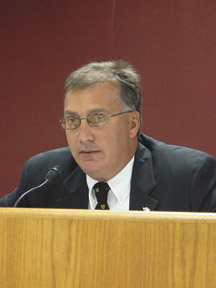The Town Council this month approved up to $822,500 in professional contracts that will be paid to 18 firms for such municipal services as town attorney, town engineer, and town surveyor. Secaucus received just 49 bids for these contracts, a sharp drop from the more than 100 bids the town received for these and other services last year.
In January 2010, the new mayoral administration of Michael Gonnelli sought to improve the town’s professional bidding process through better advertising and increased competition aimed at getting high quality services at the most economical rates.
To do this, the town, for the first time, expanded the level of advertising it did for its requests for proposals (RFPs) and was successful in attracting a broader pool of firms.
Far fewer RFPs were received this year.
________
But this year, the level of competition for professional services dropped, although the town still appears to be saving money for professional services.
Lobbying done differently
Through outsourcing some work and municipal services, a town can use a contractor’s expertise only when needed and can avoid paying salary, benefits, and other costs associated with full-time labor.
Since 2009 Secaucus has steadily cut the number of professional contracts it awards, and thus, the amount of taxpayer money paid to private firms. In 2009, the year before Gonnelli took office, the Town Council approved 23 contracts to lawyers, accountants, public relations specialists, and other professional service providers, spending more than $1 million. That number was actually $110,000 less than the amount of money the council had spent on professionals in 2008, when 24 such contracts were approved.
In its first year in office the Gonnelli administration cut the numbers even further. Last year 20 contracts were awarded and eight contracts were eliminated altogether, for a total savings of $270,000. Most of the contracts that were eliminated were for lobbyists and other attorneys who did work for the town.
Since then Secaucus has relied more heavily on paid staff and its elected officials in Trenton and Washington, D.C. – Assemblyman Vincent Prieto, Assemblywoman Joan Quigley, State Sen. Nicholas Sacco, and U.S. Congressman Steven Rothman – to lobby for its interests at the legislative level.
“They’ve been successful in addressing some issues with the county and the state,” said Gonnelli last week. “We’ve had just as much success using them as our lobbyists as we had with the paid lobbyists. I don’t see any difference.”
For example, the mayor said that Prieto helped the town secure a $300,000 transportation grant that is being used to repave local streets. And the assemblyman has been working over the past year to abolish a Meadowlands District tax sharing formula that requires Secaucus to send $3 million each year to the New Jersey Meadowlands Commission, a state agency. Until last year, a law firm had been paid about $45,000 annually to fight this cause in Trenton.
And both Prieto and Quigley are now working to make changes to the state’s Urban Transit Hub Tax Credit program, a program Secaucus officials believe is being unfairly used to lure Secaucus-based Panasonic to Newark.
Although Town Administrator David Drumeler was unable to estimate the caps on the various town contracts last year, he said that “most contractors came in under budget.”
Gonnelli also pointed out that hourly caps for all contracts awarded last year were reduced.
Fewer bids
Despite the savings, it appears the town is once again receiving few bids for its professional services. Of the 18 contracts approved this month, six attracted only one bid.
Before assuming control of the council after the 2009 elections, Gonnelli and his allies had been critical of the fact that some contracted services received only one or two bids, meaning there was very little competition for the work.
Last year, the town advertised for bids on the municipal Web site and on the League of Municipalities Web site, as in the past, but they also placed ads in two daily newspapers.
Town officials said the same level of advertising was done again this year, but far fewer RFPs were received.
“That’s not surprising,” said Gonnelli. “You tend to find more bids when there’s a new administration…We awarded contracts based on qualifications. We eliminated quite a few professional service contracts going in last year. The ones that we took back this year are the ones that performed.”
Last year, Gonnelli said the town would rebid any RFP that didn’t attract at least two or three bids. This year, he said the town has no intention to rebid for the services that attracted only one RFP.
“What was most important to us was that we advertised as broadly as we could so that as many companies as possible could bid if they wanted to,” he said. “What was most important to us was that the process was as open as it could be.”
Four contracts – for public defender, public relations/grants writer, and two for medical and dental insurance brokers – have yet to be awarded. These contracts will be awarded within the next month.
E-mail E. Assata Wright at awright@hudsonreporter.com.
